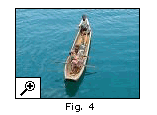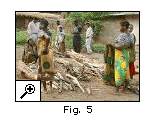|
|
 |
|
| |
 These SE teams have found that although there are country and regional variations, overall fishing and farming are the primary wealth producing systems of the Lake and its catchment. Whilst some practices are detrimental to sustainable development and may impact negatively on biodiversity others are important means of survival. For instance line fishing is a significant subsistence activity to many around the Lake. It requires little capital outlay and is a skill that is relatively easily acquired. Fish are consumed within the household, or sold to raise income for immediate needs such as medical bills, school fees and household items. These SE teams have found that although there are country and regional variations, overall fishing and farming are the primary wealth producing systems of the Lake and its catchment. Whilst some practices are detrimental to sustainable development and may impact negatively on biodiversity others are important means of survival. For instance line fishing is a significant subsistence activity to many around the Lake. It requires little capital outlay and is a skill that is relatively easily acquired. Fish are consumed within the household, or sold to raise income for immediate needs such as medical bills, school fees and household items.
Despite the short-term socio-economic importance, the SESS believes that many fishing, farming and other natural resource based activities such as fuelwood collection are not sustainable. Fuelwood, for example, is an important resource used for cooking, smoking fish, processing palm oil and brewing traditional beers. However, demand outstrips supply. Fuelwood is now sufficiently scarce in many villages that it has become economically viable for women from poorer households to collect fuelwood for sale (Fig. 5). 
Although such natural resource based income generating activities are important, particularly to the poorest, in the long term there are sustainability problems. Deforestation, associated with fuelwood collection and farming, contributes to soil erosion for instance. Population growth and migration are primary contributors to sustainability difficulties and associated problems with the conservation of the Lake's biodiversity. Consequently, the SESS has proposed a number of alternatives that should be examined in the interest of sustainability and long-term biodiversity conservation.
In order support such sustainable activities the SESS teams conducted a livelihoods analysis. They found that livelihood strategies in the region are extremely complex and dynamic. Women and children play important roles in their household's livelihoods. Children's income generating roles are particularly important to those poorer households where the children do not attend school. For example a common income generating activity in lakeshore villages is children selling snack foods on the beach to fishermen returning from the Lake (Fig. 6). |
|